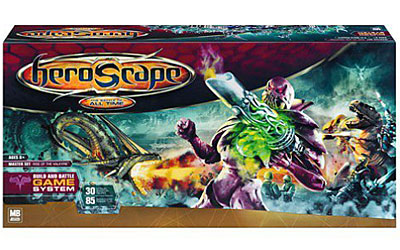HeroScape
Interlocking terrain forms a 3D field of play on which thirty detailed painted plastic toy fantasy hero miniatures compete
 Heroes and warriors of history and fantasy converge on a battlefield you design. Construct the customizable 3D interlocking board with terrain and terrain accessories. The field and the battle change with each game. Intense but easy-to-learn game play. Hero actions are governed by cards indicating movement, range, armor, and powers. Eliminate all your enemy's pieces to win. Twenty hero scape battle scenarios included. Friends bring their own characters for endless gaming variety. Package includes collectible hero pieces.
Heroes and warriors of history and fantasy converge on a battlefield you design. Construct the customizable 3D interlocking board with terrain and terrain accessories. The field and the battle change with each game. Intense but easy-to-learn game play. Hero actions are governed by cards indicating movement, range, armor, and powers. Eliminate all your enemy's pieces to win. Twenty hero scape battle scenarios included. Friends bring their own characters for endless gaming variety. Package includes collectible hero pieces.
In history, a hero is an individual who is admired and revered for their exceptional qualities, actions, and contributions that have had a significant impact on society, culture, or the course of events. Heroes often embody virtues such as courage, selflessness, leadership, and resilience, and their actions inspire others to follow their example. Throughout history, heroes have emerged in various contexts, including wars, revolutions, social movements, and cultural achievements. The concept of heroism is deeply rooted in cultural narratives and myths, often reflecting the values and aspirations of a society. Heroes can be both real historical figures and legendary or fictional characters whose stories continue to inspire and shape our understanding of courage and nobility.
Attributes of a Hero: Heroes are often characterized by their exceptional deeds and qualities. They may demonstrate extraordinary courage by facing danger or adversity for the greater good. Their selflessness and willingness to sacrifice their own well-being for the benefit of others set them apart as role models. Heroes may also exhibit leadership, wisdom, compassion, and the ability to bring about positive change in their communities or on a larger scale.
Historical Examples: In history, heroes can take on diverse forms. They may be military leaders like Joan of Arc, who led French forces during the Hundred Years' War; activists like Mahatma Gandhi, who championed nonviolent resistance in India's struggle for independence; scientists like Marie Curie, whose groundbreaking research revolutionized our understanding of radioactivity; or cultural figures like William Shakespeare, whose literary works have left an enduring impact on the world.
Evolution of Heroic Ideals: The concept of heroism has evolved over time, shaped by cultural, social, and historical contexts. Ancient civilizations celebrated mythical heroes like Hercules and Achilles, whose feats symbolized strength and honor. As societies evolved, heroism came to encompass moral and ethical qualities, highlighting the importance of values such as justice, equality, and freedom.
Legacy and Inspiration: Heroes leave a lasting legacy that inspires future generations. Their stories are often retold in literature, art, and media, serving as symbols of human potential and resilience. The notion of heroism continues to influence how societies define and honor individuals who exemplify exceptional qualities and contribute to the betterment of humanity.
A hero in history is an individual admired for their remarkable qualities and actions, often involving courage, selflessness, and positive impact on society. Heroes serve as role models and sources of inspiration, reflecting the values and aspirations of their time and culture while leaving a lasting legacy for future generations.
